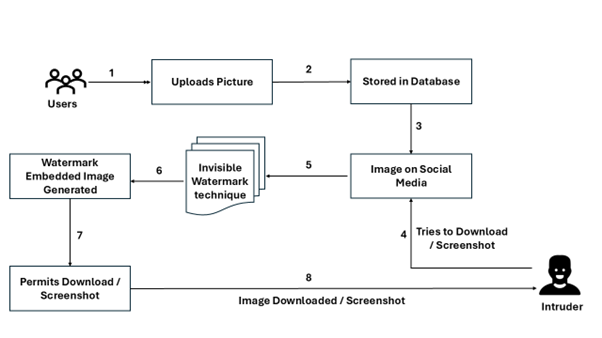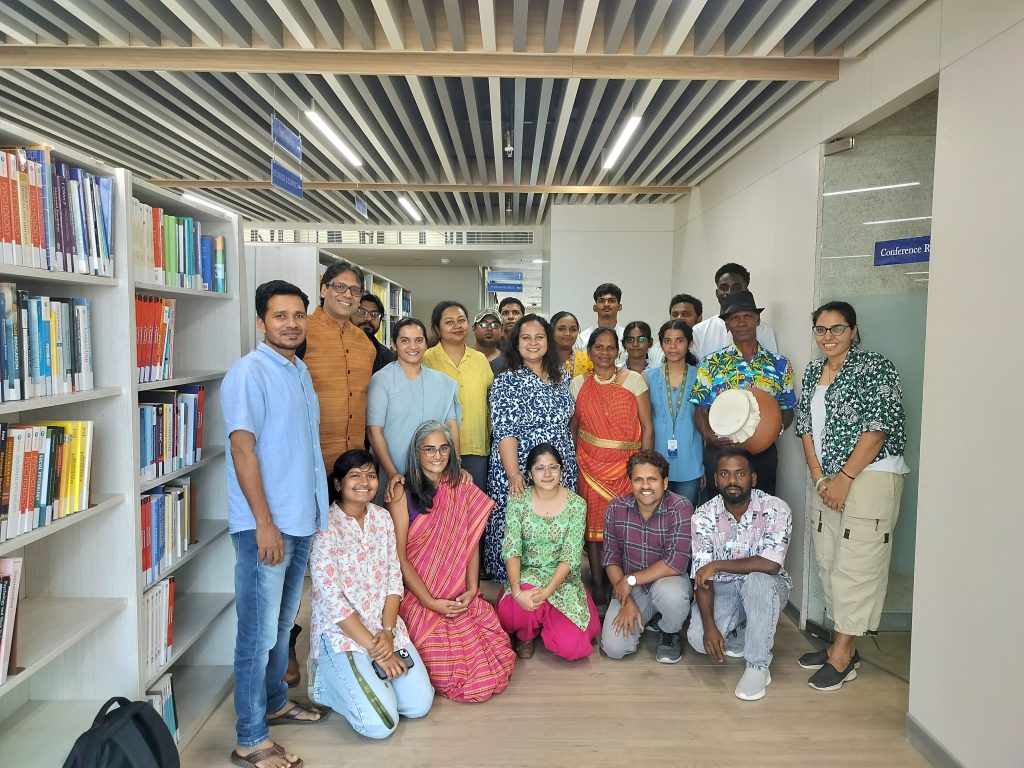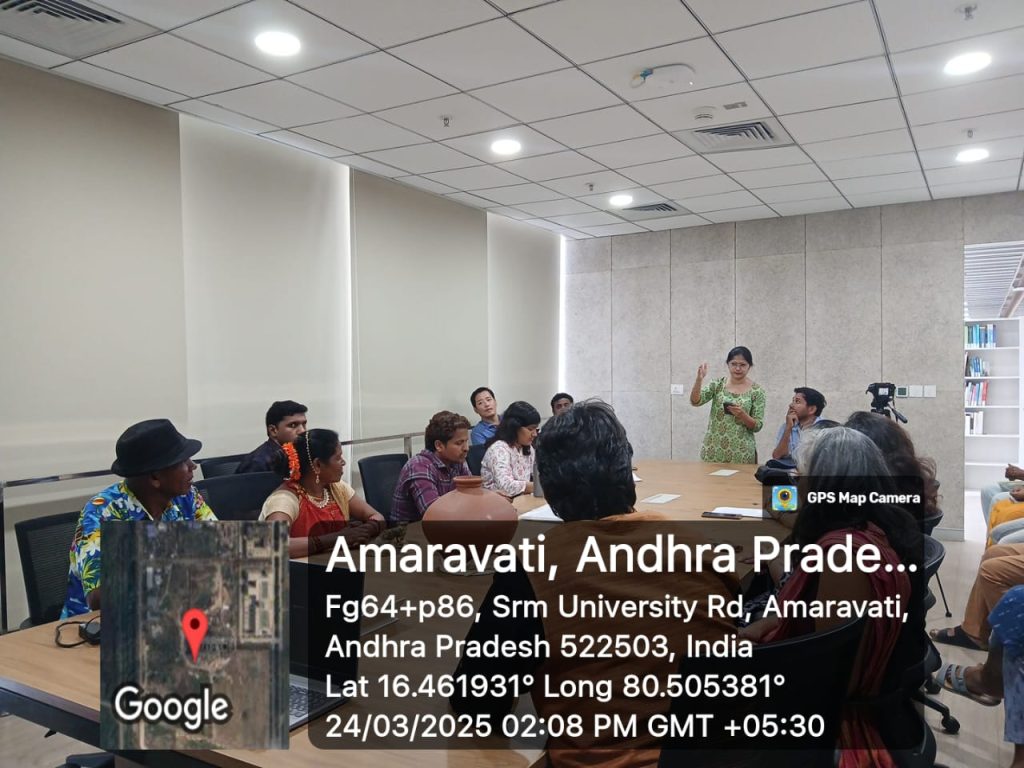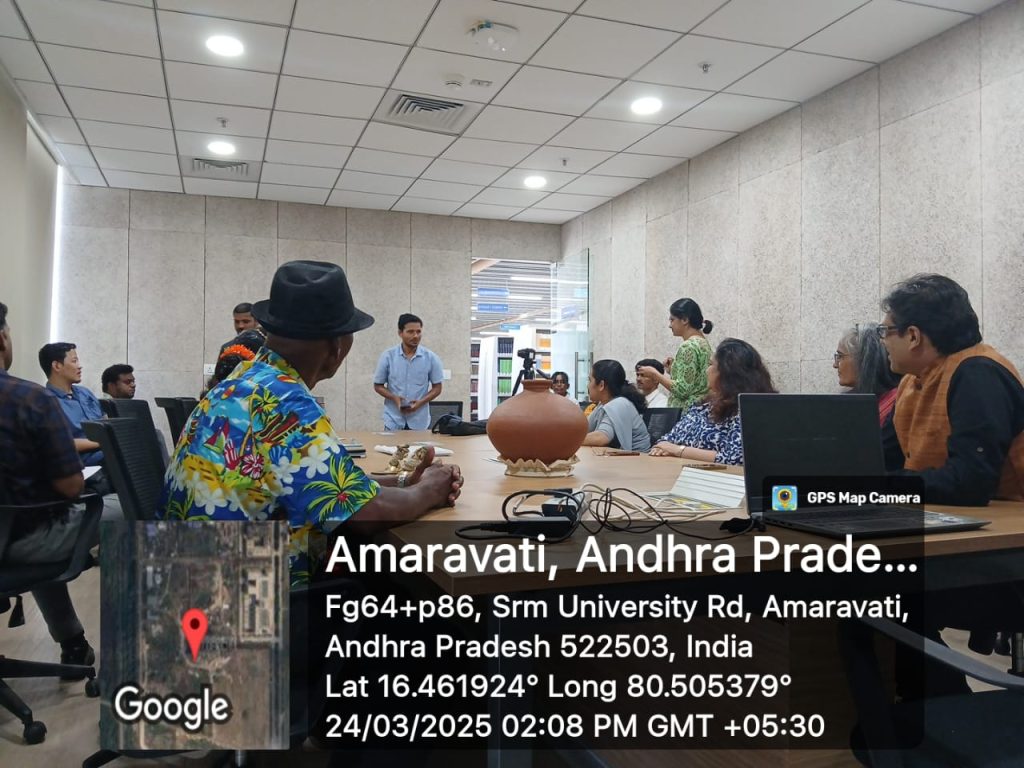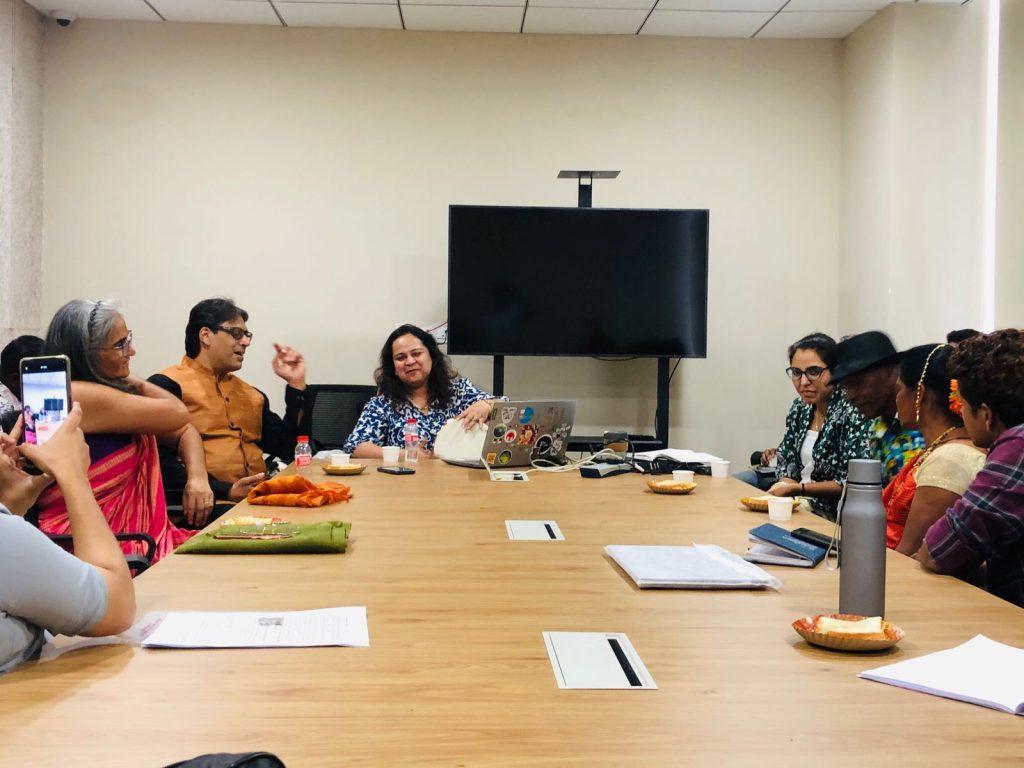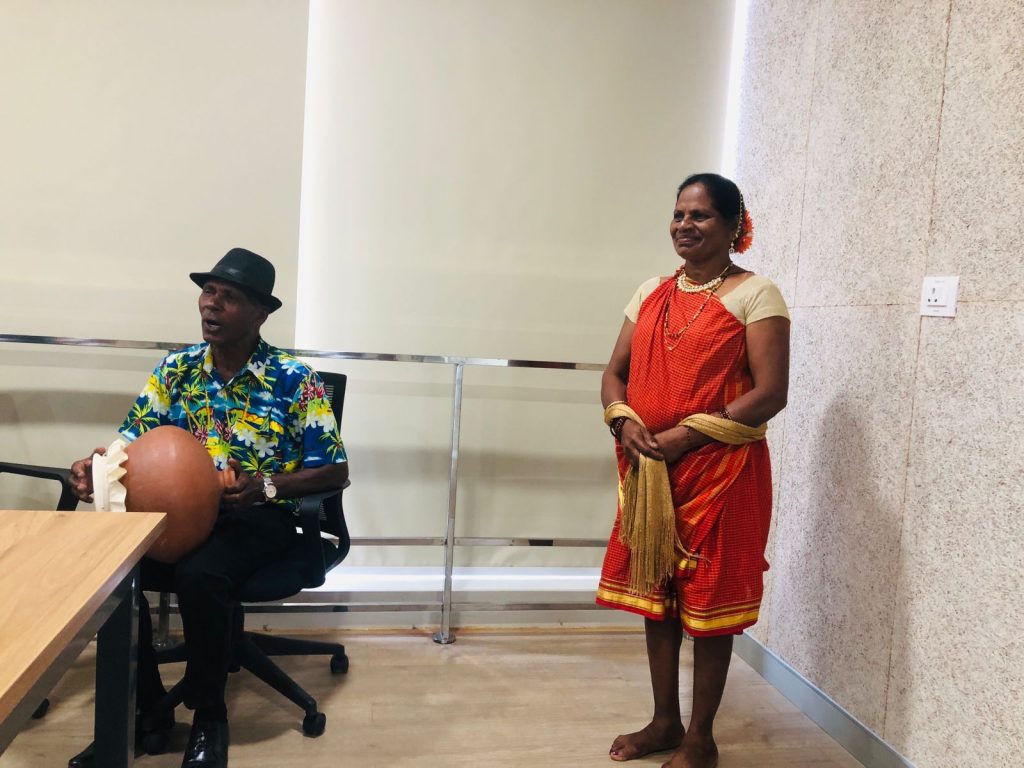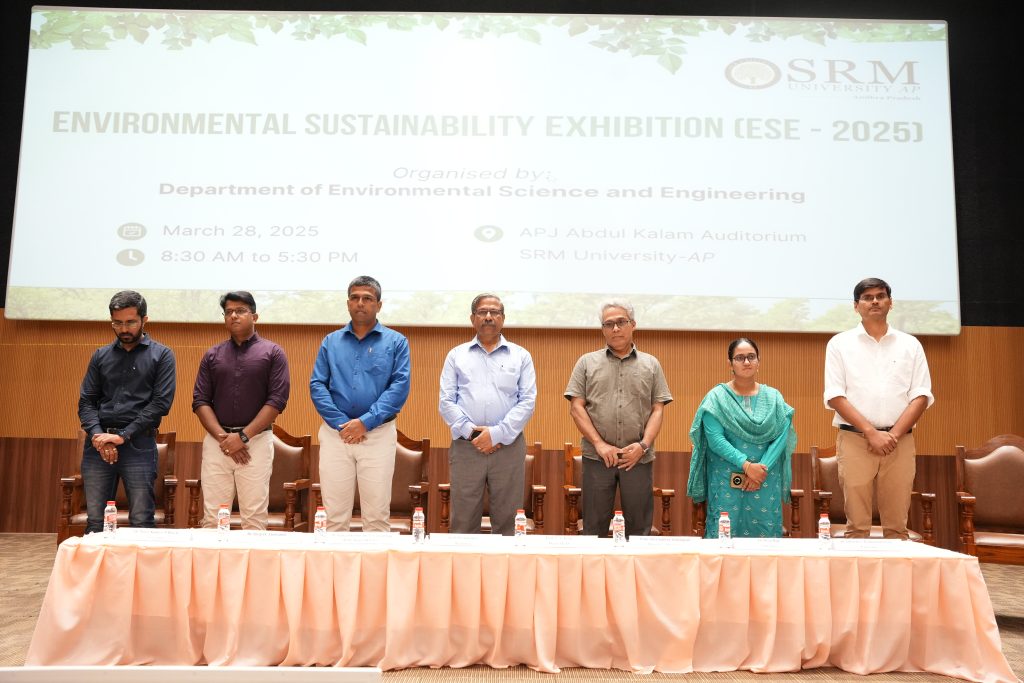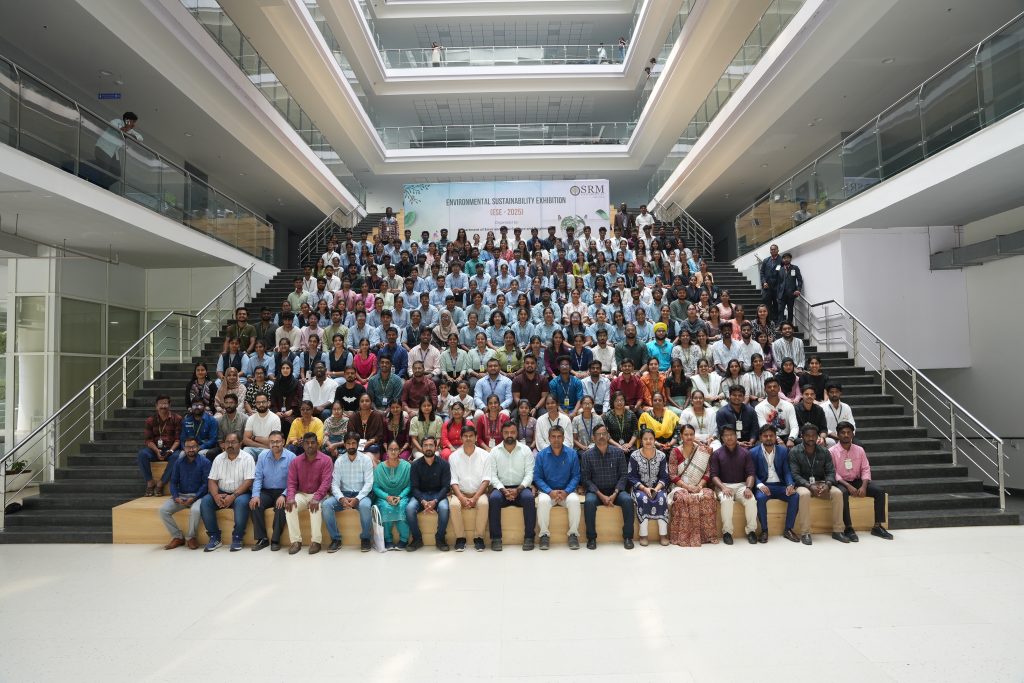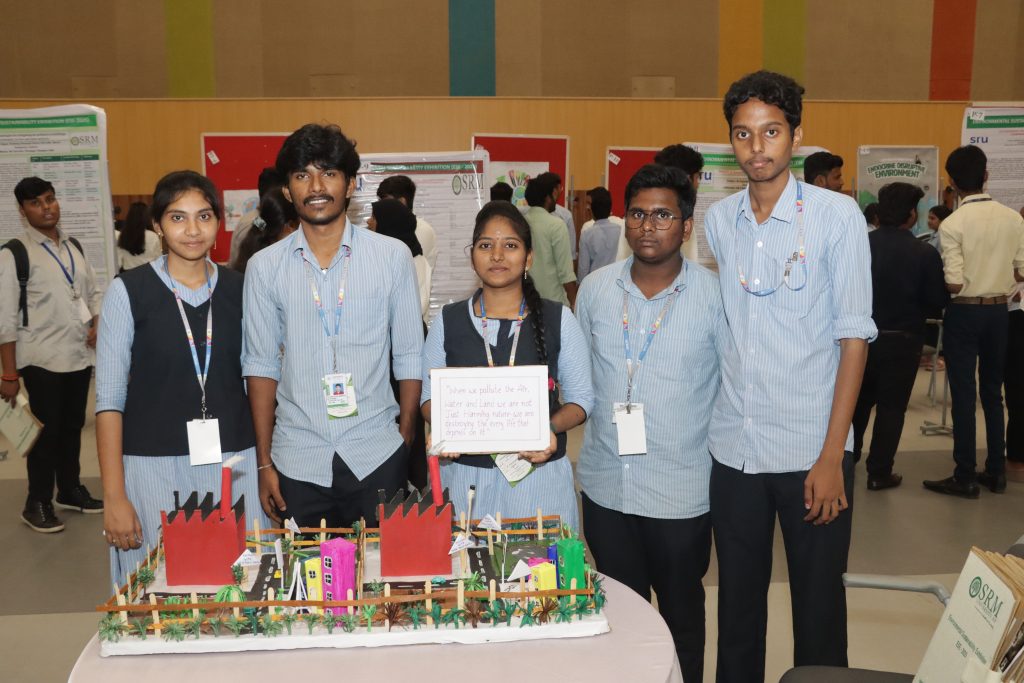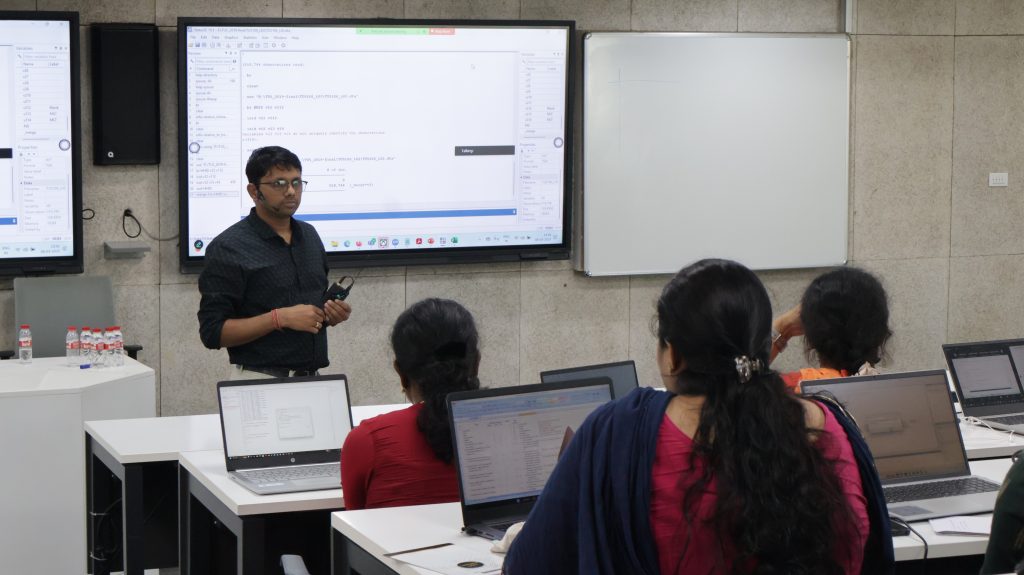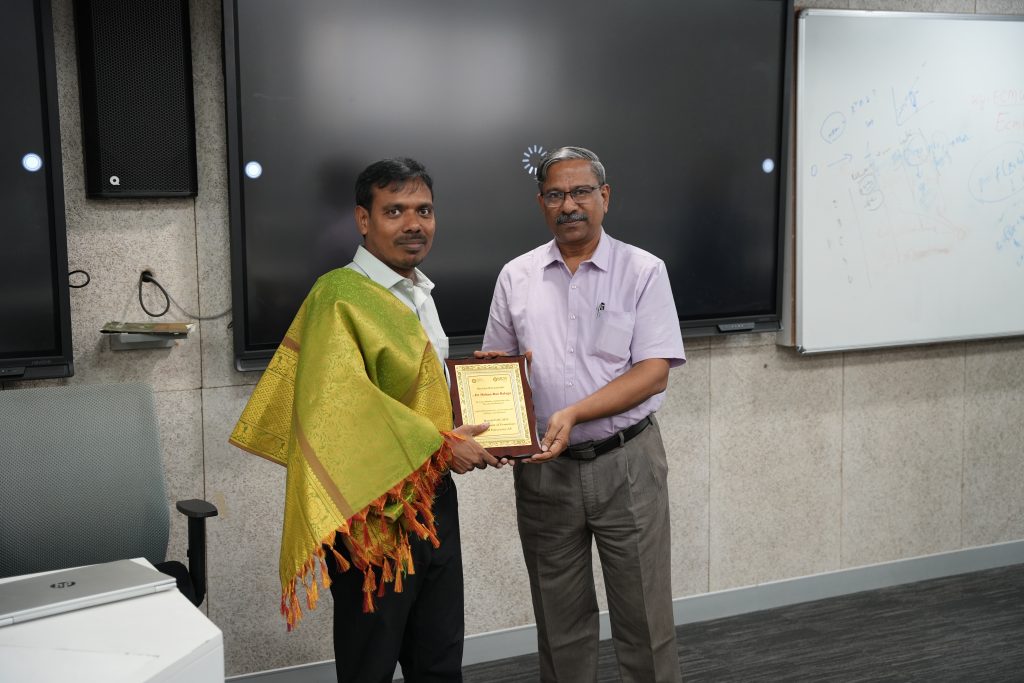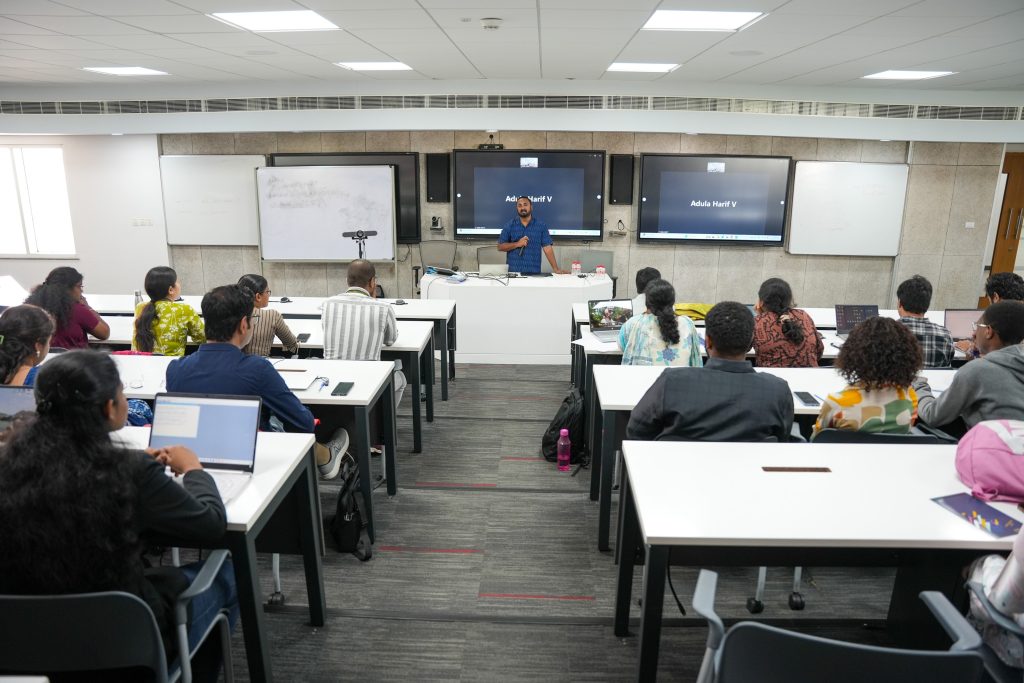All Management Events
- Proteome and Phosphoproteome Turnover Atlas in Mice – Paper Published In Cell Journal with 45.5 IF April 1, 2025
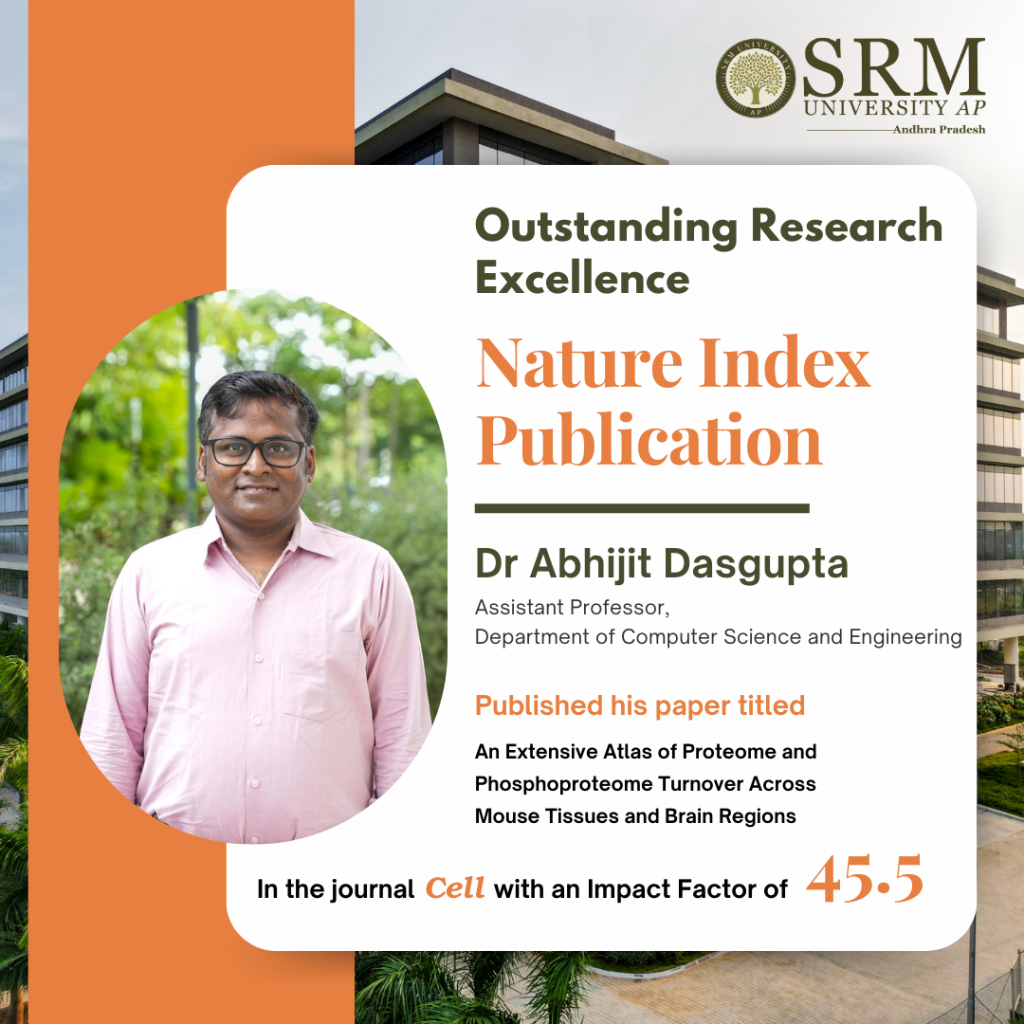
Dr Abhijit Dasgupta, Assistant Professor from the Department of Computer Science and Engineering, has published his breakthrough research article titled “Turnover Atlas of Proteome and Phosphoproteome Across Mouse Tissues and Brain Regions” in the nature index journal Cell having an impact factor of 45.5.
Abstract
This study presents a comprehensive in vivo atlas of protein and phosphoprotein turnover across 16 mouse tissues and brain regions, integrating advanced mass spectrometry with stable isotope labeling. By mapping over 11,000 proteins and 40,000 phosphosites, the study reveals tissue-specific patterns of protein lifetimes, correlating them with abundance, function, and protein-protein interactions (PPI). It highlights how phosphorylation regulates protein stability and how turnover is linked to peroxisome function, ubiquitination, and neurodegeneration-associated proteins such as Tau and α-synuclein. This high-resolution resource enhances our understanding of proteostasis and dynamic protein regulation, providing new insights into tissue-specific physiology and disease mechanisms.
Explanation of the Research in Layperson’s Terms
All cells in the body continuously make and break down proteins. The balance of these processes—called protein turnover—is vital for keeping tissues healthy. But until now, scientists didn’t have a clear, detailed map of how protein turnover works across different tissues and brain regions.
In this study, researchers used advanced techniques to measure how long thousands of proteins and their phosphorylated (chemically modified) versions last in 16 parts of the mouse body. They discovered that some proteins, especially in the brain and heart, live much longer than others. They also found that proteins interacting with each other often have similar lifespans, and that specific chemical modifications like phosphorylation can either stabilize or destabilize key proteins—such as those involved in Alzheimer’s and Parkinson’s diseases.
The team created an online tool that lets other scientists explore this rich dataset. The findings can help understand tissue function better and may lead to new ways to treat diseases by targeting protein stability.
Practical Implementation/ Social Implications of the Research
Practical Implementation:
This turnover atlas provides a foundational resource for drug development and tissue-specific disease research. It supports AI-driven approaches to predict protein dynamics, aids in identifying long-lived disease-related proteins, like Tau and α-synuclein, and enhances biomarker discovery for neurodegenerative and metabolic diseases. The integrated tool Tissue-PPT allows researchers to explore and analyze protein lifespan and phosphorylation patterns across tissues.
Social Implications:
Understanding how proteins behave differently across tissues could help create more precise therapies for complex diseases such as Alzheimer’s, Parkinson’s, and cardiomyopathies. The dataset empowers researchers globally to explore protein turnover without relying heavily on animal experiments, advancing ethical and efficient biomedical research.
Collaborations
- Yale University School of Medicine, CT, USA
- St. Jude Children’s Research Hospital, TN, USA
- University Medical Center Göttingen, Germany
- University of Trieste, Italy
- West China Hospital, Sichuan University, China
Future Research Plans
The next phase will focus on AI-driven modeling of site-specific phosphorylation turnover in relation to disease phenotypes, using the Tissue-PPT dataset as a foundation. This includes integrating proteomics, phosphoproteomics, and transcriptomic data to refine our understanding of proteome regulation. Special attention will be given to how phosphorylation modulates the stability of neurodegenerative disease proteins and the development of targeted dephosphorylation therapeutics (e.g., PhosTACs).
This research aims to inform personalised interventions and identify novel therapeutic targets by understanding how tissue-specific protein lifespans are regulated under physiological and pathological conditions.
Continue reading →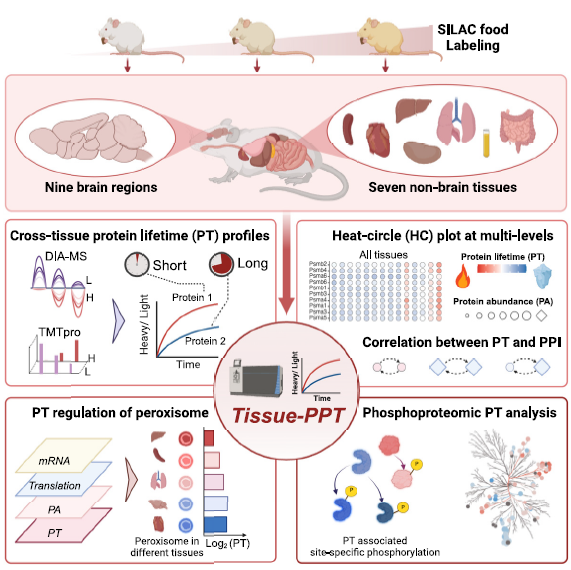
- SRMAP Hosts Environmental Sustainability Exhibition-2025 April 1, 2025
The Hindu
Continue reading →
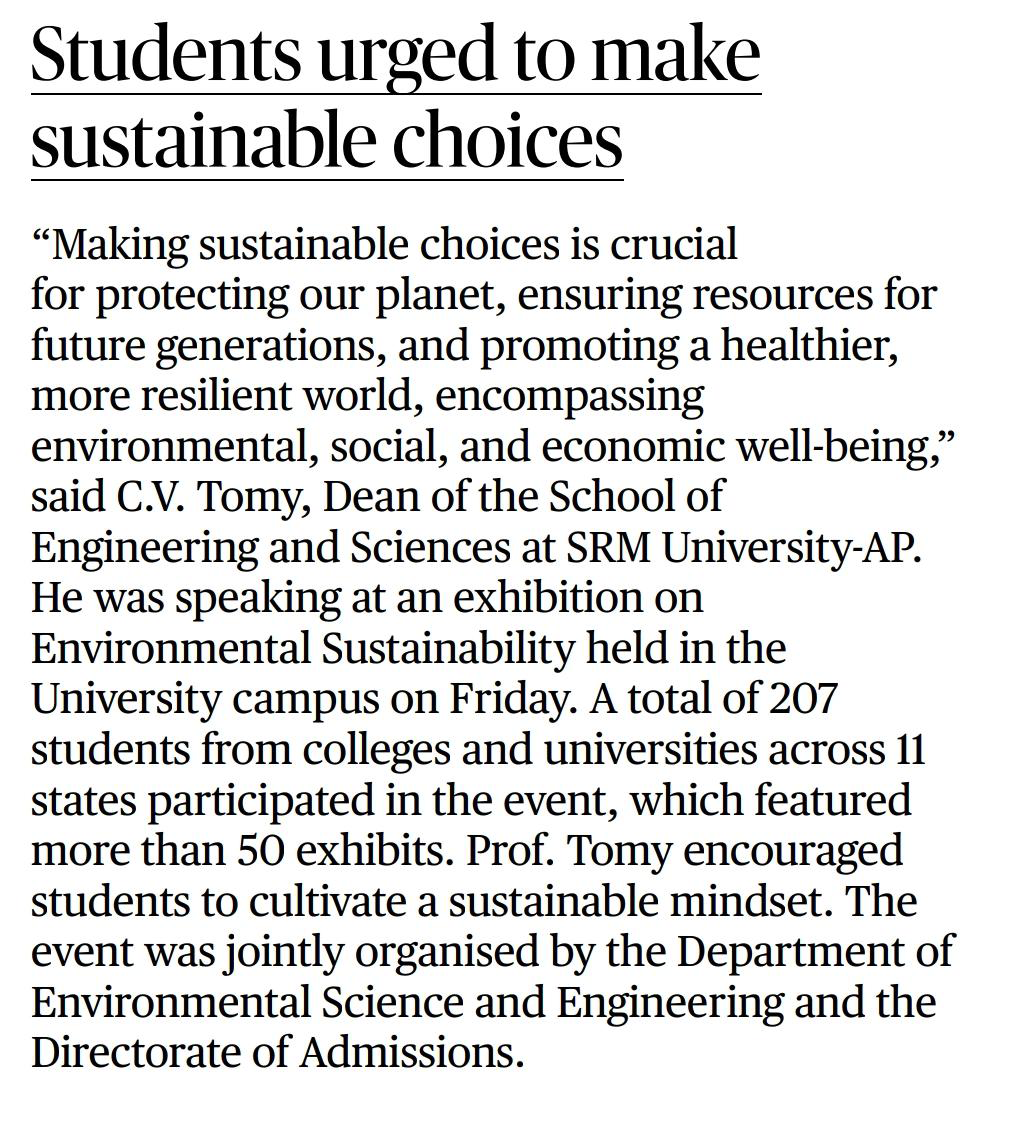
The Hans India
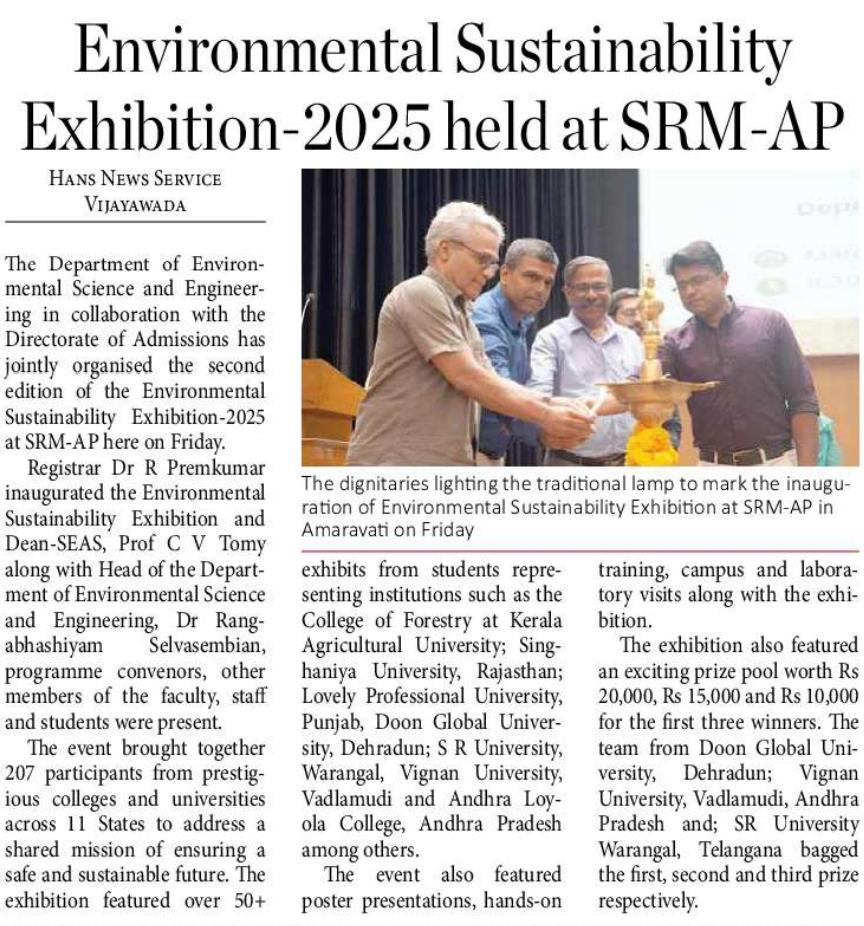
The Pioneer
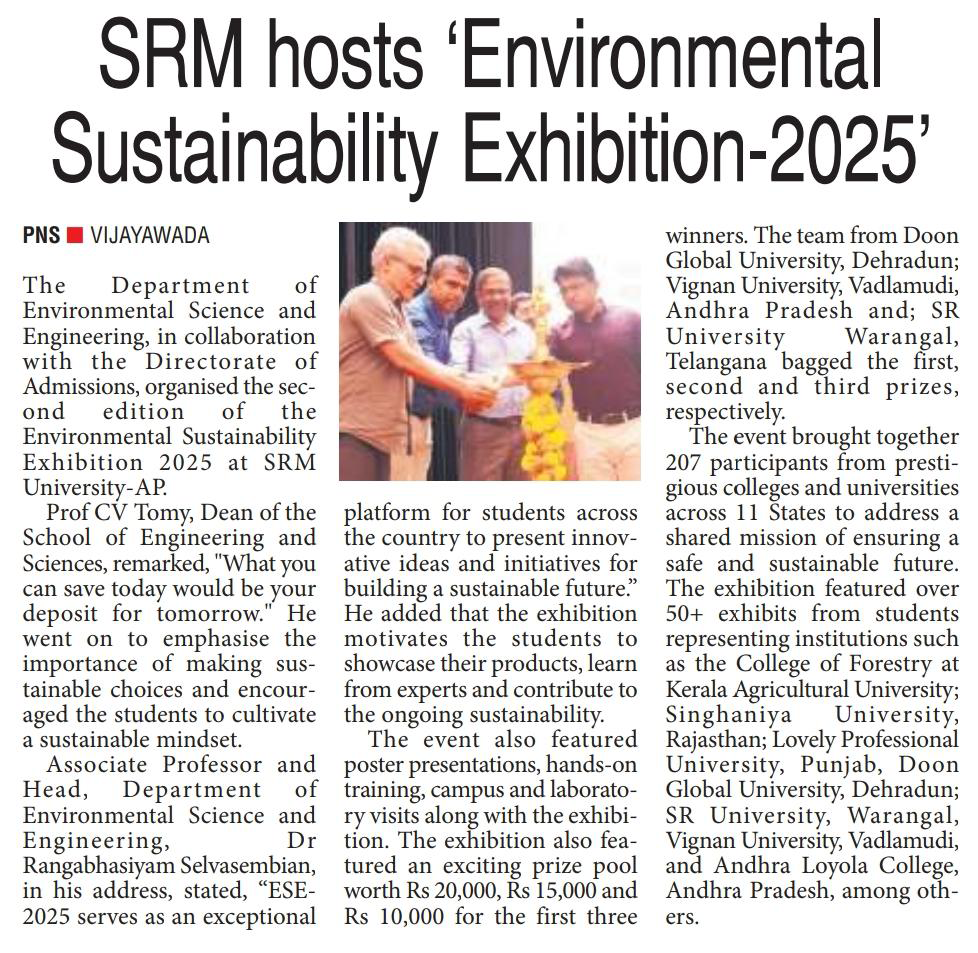
Eenadu
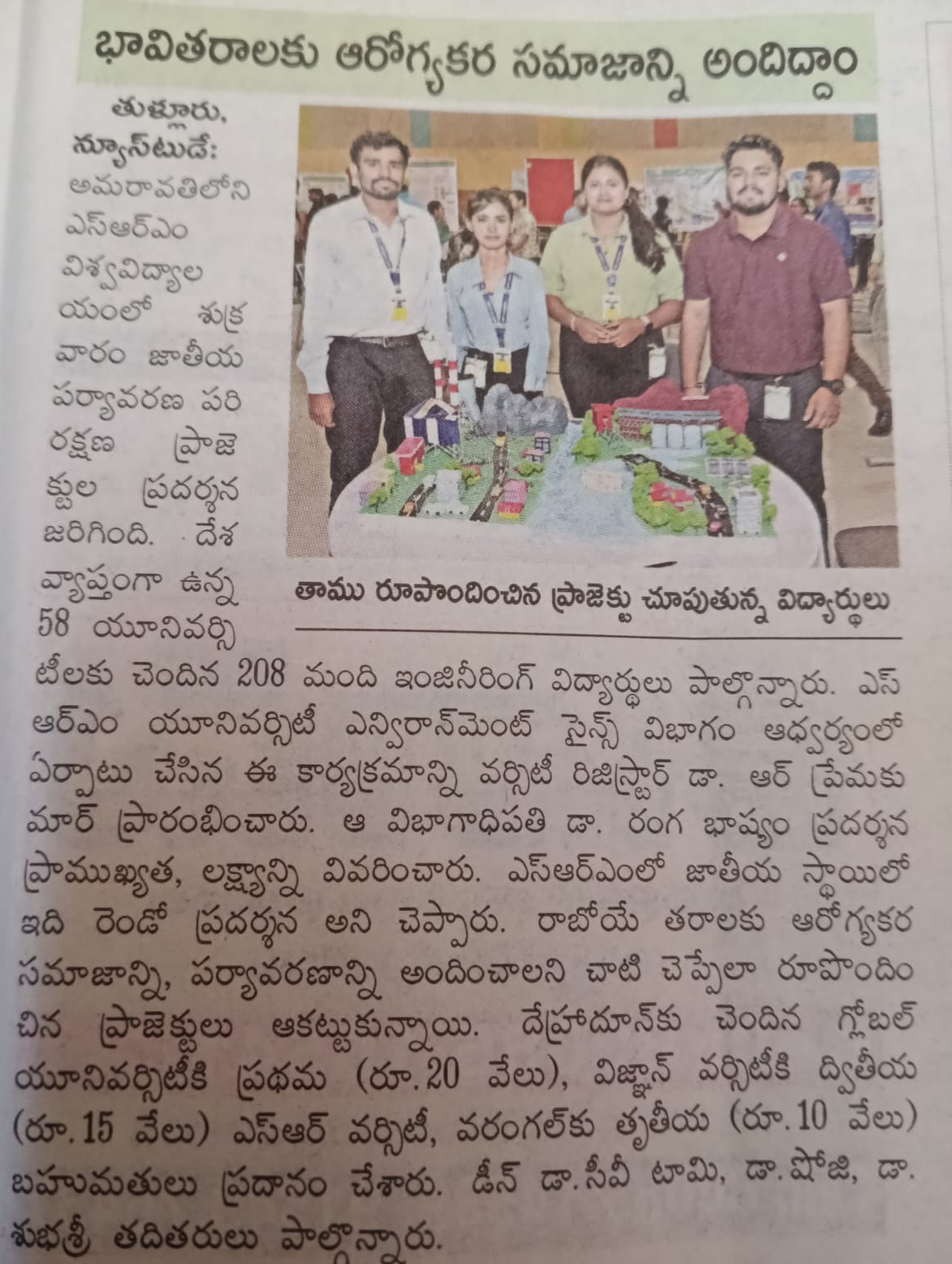
Andhra Prabha
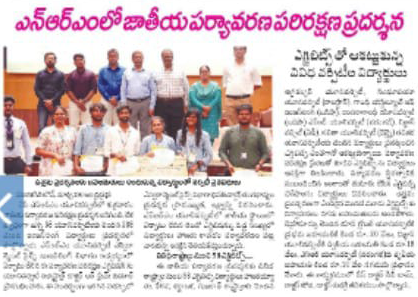
Mangalagiri Times
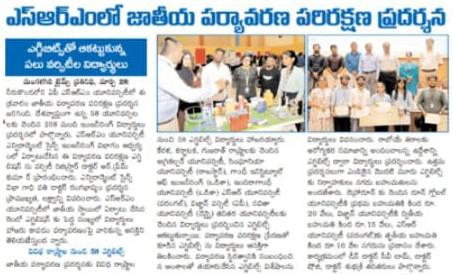
Andhra Patrika
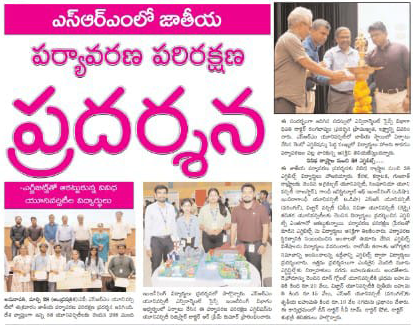
Surya
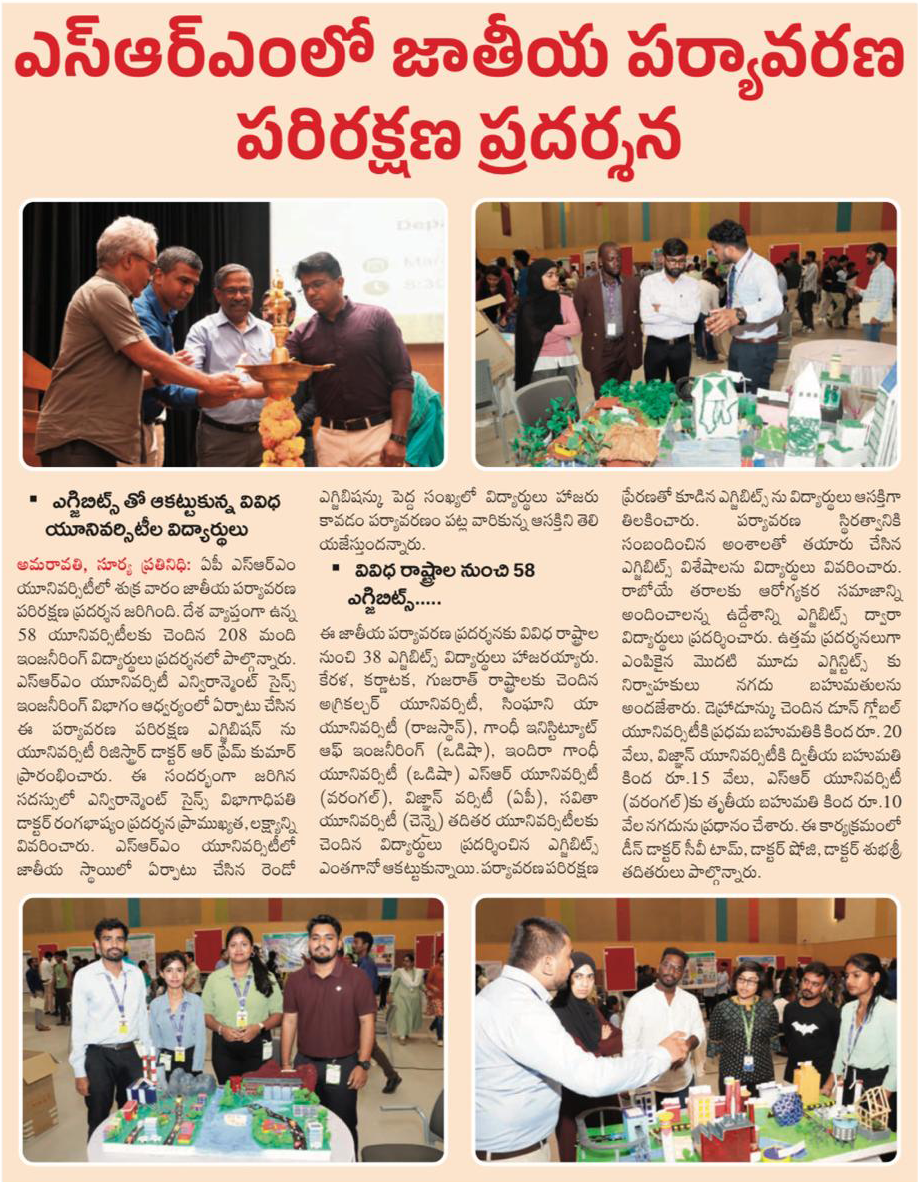
Vartha
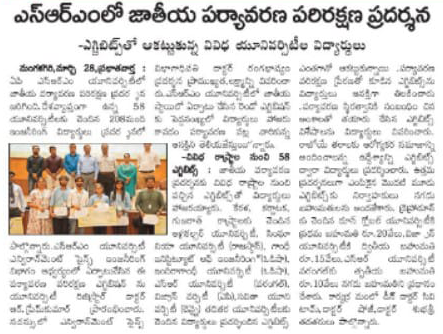
Arth Prakash
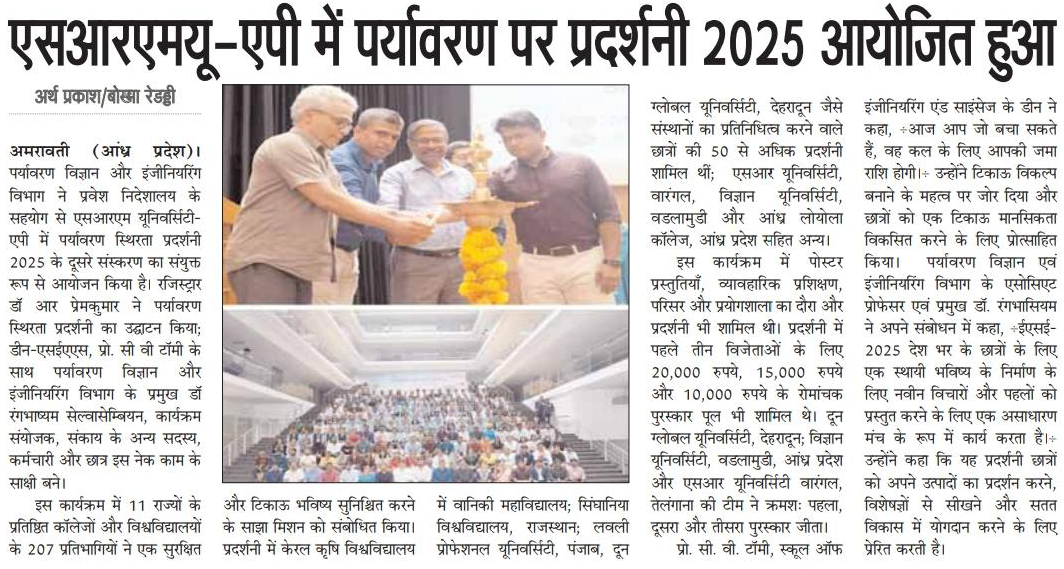
- Myco-remediation Strategies: Green Solution to Soil Pollution March 31, 2025
 Dr Debajyoti Kundu, Assistant Professor at the Department of Environmental Science and Engineering in his research paper, Pharmaceuticals and Personal Care Products in Soil: Sources, Impacts and Myco-remediation Strategies, speaks of the innovative solutions to tackle contamination of soil. Dr Kundu’s research focuses on leveraging natural processes of fungi to promote sustainable environmental management.
Dr Debajyoti Kundu, Assistant Professor at the Department of Environmental Science and Engineering in his research paper, Pharmaceuticals and Personal Care Products in Soil: Sources, Impacts and Myco-remediation Strategies, speaks of the innovative solutions to tackle contamination of soil. Dr Kundu’s research focuses on leveraging natural processes of fungi to promote sustainable environmental management.Abstract:
Bioremediation is a sustainable approach for mitigating pharmaceutical and personal care product (PPCP) contamination in soil. This review highlights mycoremediation as an advanced fungal-based strategy for PPCP degradation. Fungi possess unique enzymatic pathways and metabolic diversity, allowing them to break down persistent pollutants in challenging environmental conditions. The paper discusses key fungal species, enzymatic mechanisms, environmental factors influencing degradation efficiency, and innovative biotechnological approaches such as myco-nanotechnology and enzyme engineering. By integrating these advancements with circular economy principles, this research underscores fungi’s role in sustainable environmental management.
Explanation in layperson’s terms:
Pharmaceuticals and personal care products (PPCPs), such as medicines, soaps, and cosmetics, often end up in the soil through wastewater and agricultural runoff. These chemicals persist in the environment, harming ecosystems and potentially entering our food supply. Our research explores how fungi, nature’s recyclers, can help clean up these pollutants. Certain fungi produce special enzymes that break down harmful substances into harmless compounds. By harnessing this natural process, we propose eco-friendly solutions to reduce pollution and protect soil and water quality for future generations.
Practical and Social Implications:
Mycoremediation offers a sustainable, cost-effective solution for removing PPCPs from soil, protecting water quality, and reducing human exposure to contaminants. By preventing pollutant uptake in crops, it enhances food safety and supports sustainable agriculture. This research also informs policies on wastewater treatment and pollution control, promoting eco-friendly remediation technologies for environmental and public health protection.
Collaborations:
This research is a collaborative effort involving experts from:
- Voice of Environment (VoE), Guwahati, Assam
- University of North Bengal, Darjeeling, West Bengal
- RCC Institute of Information Technology, Kolkata
- Sukanta Mahavidyalaya, University of North Bengal, Dhupguri, West Bengal
- SPMR College of Commerce, Jammu
- SRM University-AP, Andhra Pradesh
- CSIR – National Environmental Engineering Research Institute (CSIR-NEERI), Nagpur, India
Future Research Plans:
Future research will focus on scaling up my coremediation for field applications, optimizing fungal enzyme efficiency through enzyme engineering, and exploring microbial consortia for enhanced pollutant degradation. Myco-nanotechnology will be further developed to improve fungal stability and reusability. Additionally, studies will assess long-term soil health impacts and support policy frameworks for integrating fungal bioremediation into wastewater treatment and agricultural practices.
Continue reading → - Ghumat Stories: Exploring the Folk Legacy of the Percussion Instrument March 31, 2025
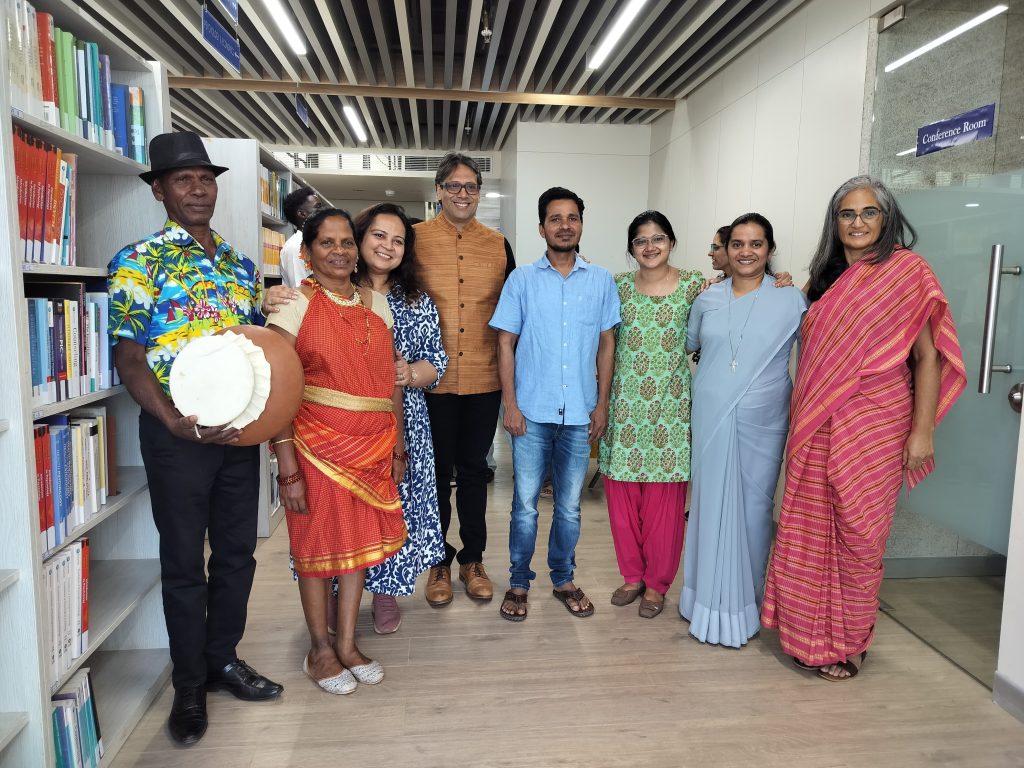 The Department of Sociology and Anthropology at the varsity organised a round table talk, Ghumat Stories, as part of the SEED Grant proceedings awarded to Dr Sebanti Chatterjee, Assistant Professor at the department. The session explored the cultural and social significance of the ghumat, a traditional percussion instrument made of clay and crafted using the hide of the monitor lizard.
The Department of Sociology and Anthropology at the varsity organised a round table talk, Ghumat Stories, as part of the SEED Grant proceedings awarded to Dr Sebanti Chatterjee, Assistant Professor at the department. The session explored the cultural and social significance of the ghumat, a traditional percussion instrument made of clay and crafted using the hide of the monitor lizard.The event featured a diverse panel, including musician Mr Omar, documentary filmmaker Ms Nalini, musician Ms Sonia, researcher Ms Divya, ghumat player Mr Felipe, and dancer Ms Placania, alongside Dr Bikku, Head of the Department of Sociology and Anthropology, Dr Nishanth K S, other faculty members and students.
Ms Nalini’s documentary delved into the ghumat’s historical and cultural relevance. Musicians Mr Omar and Ms Sonia elaborated on the social and lyrical aspects of ghumat and folk dances such as Mannddô, that shed light on its connection to folk traditions.
Artists Felipe and Placania captivated the audience with live demonstrations. Felipe showcased how ghumat is played, while Placania performed the traditional folk dance associated with the instrument, while adorning the saree worn in a style particular to the dance.
Researcher Ms Divya provided insights into various folk song traditions linked to ghumat, including Mannddô. She classified these traditions within both the Mangalorean and Goan contexts, discussing how the ghumat functions as a “talking drum” in these folk traditions. Ms Divya further elaborated on the diverse tempos and occasions where ghumat-accompanied folk songs are performed.
Ms Divya also shed light on the craftsmanship of ghumat, explaining how Goan tribes such as the Kunbis, Karbis, and Siddhis procure, cure, and treat the hide of monitor lizard for the instrument’s making. She explained the transition of using goat skin in present times due to the prohibition of hunting the monitor lizards. Her discourse further highlighted the cultural and social significance of ghumat in folk communities today.
The session offered the attendees an understanding of the ghumat’s enduring legacy, and the tradition that will keep it alive in the contemporary cultural landscape.
Continue reading → - ESE 2025: Inspiring Innovations March 29, 2025
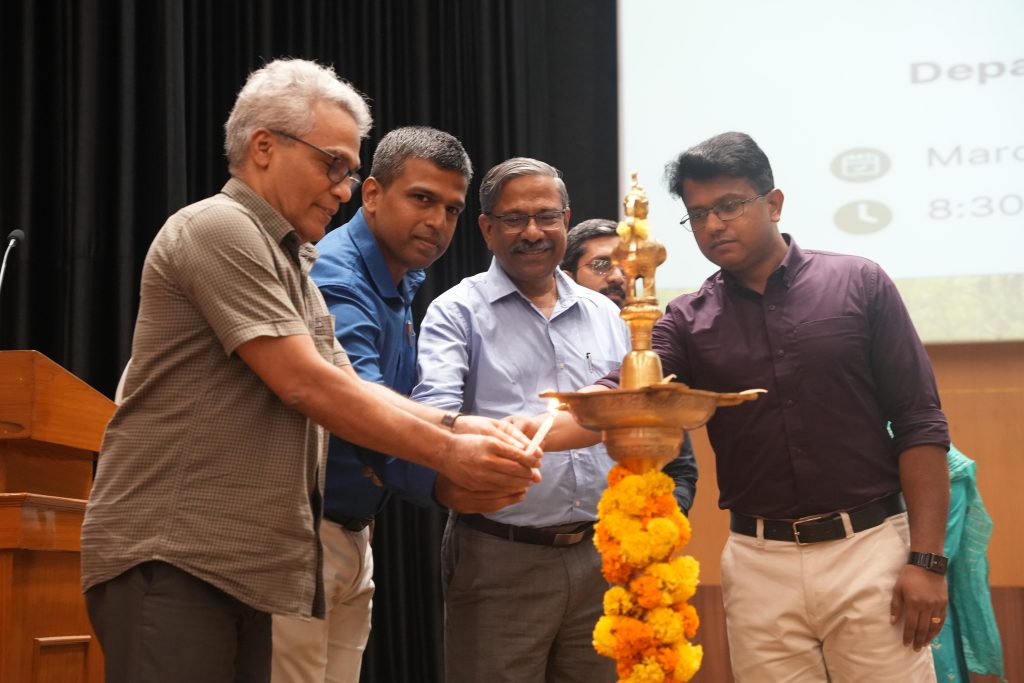 The Department of Environmental Science and Engineering in collaboration with the Directorate of Admissions have jointly organised the second edition of the Environmental Sustainability Exhibition 2025. Registrar, Dr R Premkumar declared the Environmental Sustainability Exhibition open; Deans-SEAS, Prof. C V Tomy along with Head of the Department of Environmental Science and Engineering, Dr Rangabhashiyam Selvasembian, Programme Convenors, other members of the faculty, staff and students bore witness to this noble cause.
The Department of Environmental Science and Engineering in collaboration with the Directorate of Admissions have jointly organised the second edition of the Environmental Sustainability Exhibition 2025. Registrar, Dr R Premkumar declared the Environmental Sustainability Exhibition open; Deans-SEAS, Prof. C V Tomy along with Head of the Department of Environmental Science and Engineering, Dr Rangabhashiyam Selvasembian, Programme Convenors, other members of the faculty, staff and students bore witness to this noble cause.The event brought together 207 participants from prestigious colleges and universities across 11 states to address a shared mission of ensuring a safe and sustainable future. The exhibition featured over 50+ exhibits from students representing institutions such as the College of Forestry at Kerala Agricultural University; Singhaniya University, Rajasthan; Lovely Professional University, Punjab, Doon Global University, Dehradun; SR University, Warangal, Vignan University, Vadlamudi and Andhra Loyola College, Andhra Pradesh among others.
The event also featured poster presentations, hands-on training, campus and laboratory visits along with the exhibition. The exhibition also featured an exciting prize pool worth Rs 20,000, Rs 15,000 and Rs 10,000 for the first three winners. The team from Doon Global University, Dehradun; Vignan University, Vadlamudi, Andhra Pradesh and; SR University Warangal, Telangana bagged the first, second and third prize respectively.
Prof. C V Tomy, Dean of the School of Engineering and Sciences, remarked, “What you can save today would be your deposit for tomorrow.” He went on to emphasise the importance of making sustainable choices and encouraged the students to cultivate a sustainable mindset. Associate Professor and Head, Department of Environmental Science and Engineering, Dr Rangabhasiyam in his address stated, “ESE-2025 serves as an exceptional platform for students across the country to present innovative ideas and initiatives for building a sustainable future.” He added, the exhibition motivates the students to showcase their products, learn from experts and contribute to the ongoing sustainability.
Programme convenor, Dr Shoji D Thottathil highlighted the objective of the Exhibition. He stated that, “An exhibition of this calibre is an avenue for people to discuss solutions to environmental problems. Exhibitions such as these transform ideas into innovations.” He emphasised that sustainability is interdisciplinary and requires collaboration among diverse minds.
ESE 2025 served as a call to action asking society to rethink their approach towards environmental challenges in sustainable development.
Continue reading → - The Demographic Gamble: How Andhra Pradesh is leveraging its Gender, Silver, and Youth Dividends to shape the Future? March 28, 2025
- Industrial Visit to Reliance Industries-KGD6 Oil & Gas March 27, 2025
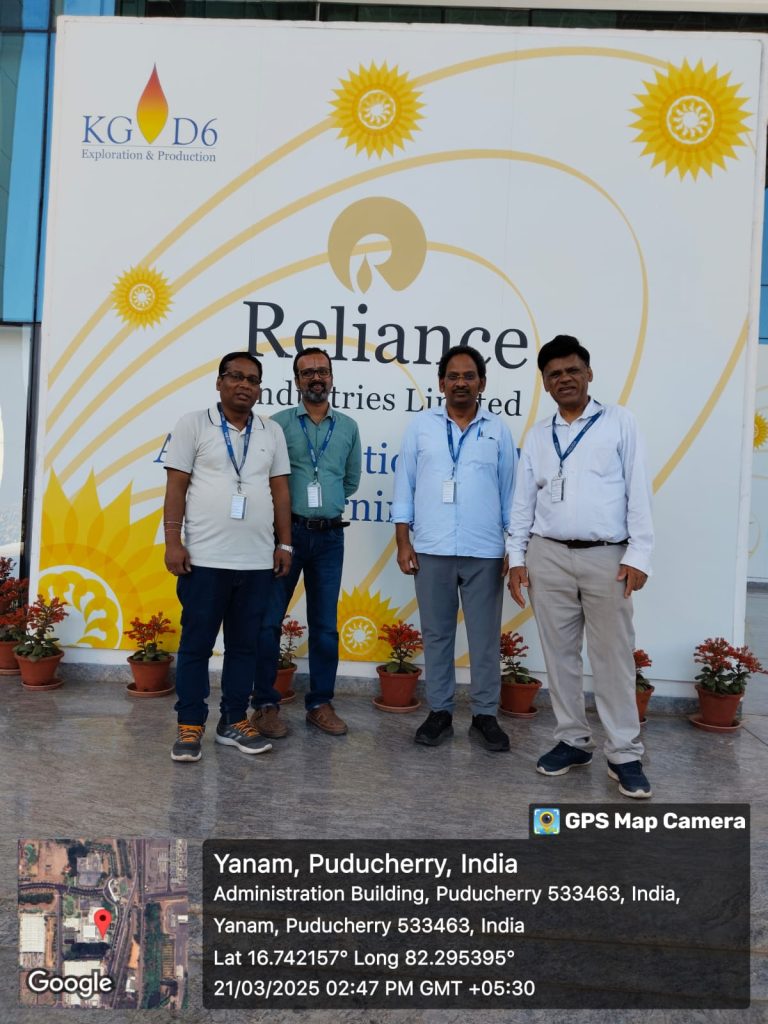
The Department of Mechanical Engineering under the School of Engineering and Sciences at SRM University-AP, organised an industrial visit on March 22, 2025 to Reliance Industries – KGD6 Oil & Gas, Andhra Pradesh.
The Industrial visit helped enhance the practical knowledge and industry exposure of the B.Tech & M.Tech students in the field of oil and gas extraction and learn first-hand the sustainable practices followed in the industry. The visit aligned with the students academic curriculum and prepared them for a future in the energy sector.
The visit was led by faculties, Dr Gurumurthy Kagita, Prof. Prakash Jadhav, Dr Satya Pramod Jammy, Dr Chandan Kumar, and Dr Supen Kumar Sah from the Department of Mechanical Engineering, who accompanied the students throughout the visit. During the visit, students gained insights of operational aspects of oil and gas industries, offshore and onshore adopted technologies, pollution control strategies, real-time monitoring, automation, control systems used in oil and gas operations and environmental management techniques. Experts from Reliance Industries-KGD6 Oil & Gas explained advanced drilling techniques, offshore and onshore extraction processes, and storage techniques of natural gases to our students. The visit also provided insights into safety protocols, automation in industrial processes and sustainability practices in the Oil & Gas industry.
The visit was highly beneficial for students as it bridged the gap between theoretical knowledge and real-world applications. It also offered an opportunity to interact with industry professionals and understand the challenges in oil and gas industries.
Continue reading → - Two-Day Workshop on Applied Econometrics & Its Applications in STATA and R March 27, 2025
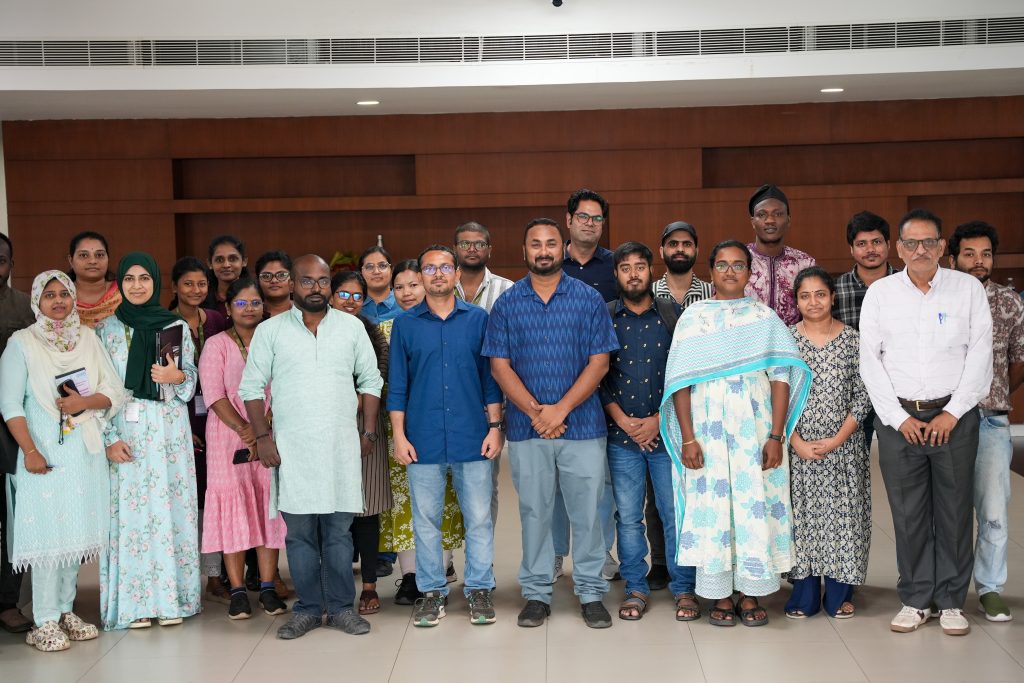
The Department of Economics at Easwari School of Liberal Arts successfully organised a two-day workshop titled “Applied Econometrics: Leveraging with Software and Databases” on March 7 – 8, 2025. The workshop witnessed the participation of approximately 40 attendees, comprising academicians, research scholars, and students from various institutions, including SRM IST, VIT-AP and Amrita University. The significant turnout reflected the keen interest in applied econometrics and the practical implementation of statistical software (R and STATA) for economic analysis.
The primary objective of the workshop was to provide a comprehensive understanding of econometric principles while emphasising hands-on training with statistical software such as STATA and R. Participants received practical exposure to key econometric techniques, including time series modelling, cross-sectional data analysis, and panel data estimation, thereby enhancing their empirical research capabilities.
The workshop featured four insightful sessions conducted by distinguished experts in the field of econometrics:
- Dr Anandarao Suvvari (IIT Goa) – Delivered an in-depth session on fundamental econometric techniques and their applications in STATA and R.
- Dr Mohan Rao Balaga (IIT Dharwad) – Provided a comprehensive analysis of time series methodologies, covering ARIMA, VECM, VAR, and ARDL models using macroeconomic and financial datasets.
- Dr Pratap C Mohanty (IIT Roorkee) – Delivered a session on cross-sectional data techniques, encompassing linear and non-linear models, instrumental variable (IV) estimation, and applications utilizing NSSO and large-scale survey data.
- Dr Vineesh Prakash (SRM University-AP) – Conducted an extensive session on panel data models, discussing Fixed Effects (FE), Random Effects (RE), Generalized Method of Moments (GMM), and dynamic panel models using CMIE ProwessIQ data.
The interactive nature of the sessions enabled participants to engage with the resource persons, deliberate on real-world econometric applications, and undertake practical case studies utilizing empirical datasets. The rigorous discussions and hands-on exercises significantly contributed to a deeper understanding of applied econometrics.
This two-day workshop proved an enriching academic initiative, equipping participants with essential econometric skills and strengthening their analytical capabilities in economic and financial data analysis. The positive feedback from attendees underscored the effectiveness of the workshop particularly in integrating theoretical knowledge with hands-on implementation.
Continue reading → - Patent to Boost Health and Safety Protocols March 26, 2025
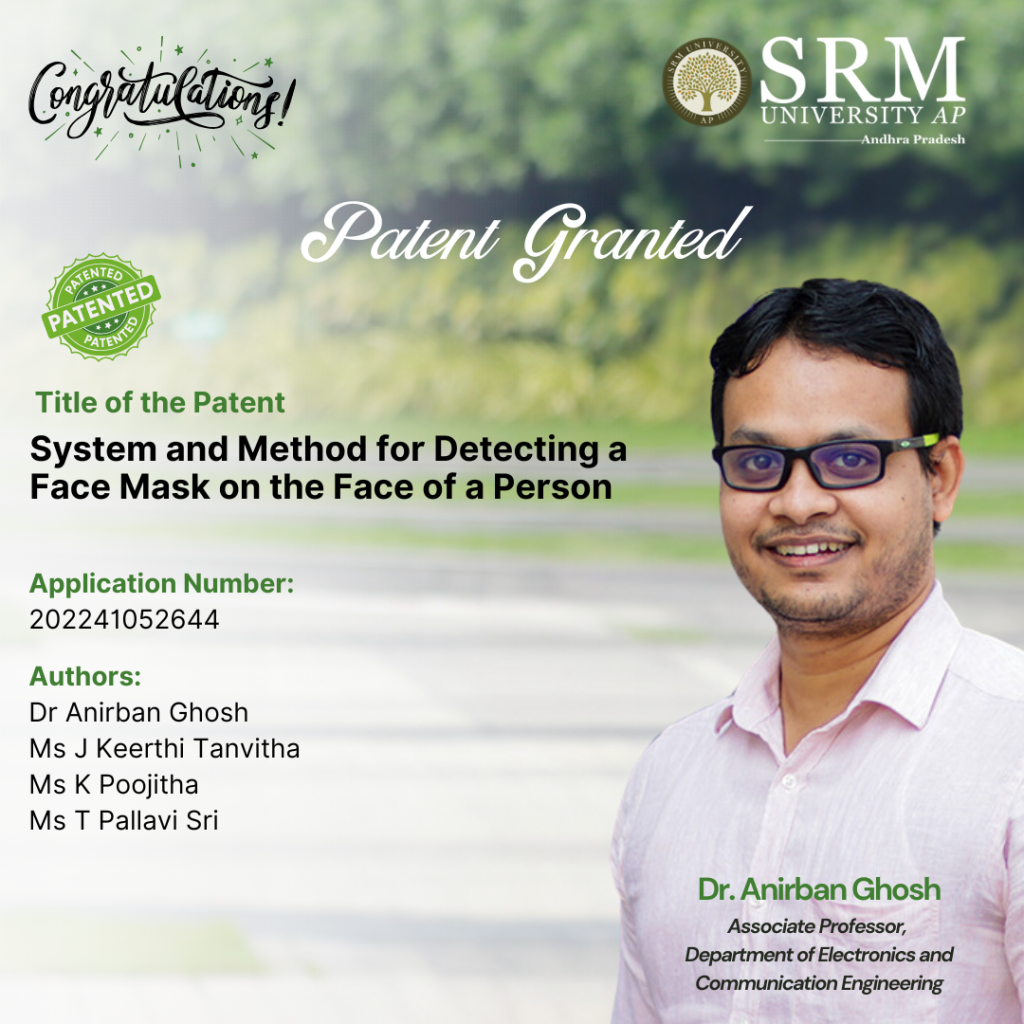 The patent titled, System and Method for Detecting a Face Mask on the Face of a Person with application number: 562697 by Assistant Professor, Dr Anirban Ghosh and his students from the department Ms J Keerthi Tanvitha, Ms K Poojitha, Ms T Pallavi Sri, has come up with a novel idea that focuses on developing a system and method for detecting face masks on individuals before they enter a gated space. Their research uses image capture, face detection, mask-wearing verification, and temperature sensing to ensure compliance with health and safety protocols.
The patent titled, System and Method for Detecting a Face Mask on the Face of a Person with application number: 562697 by Assistant Professor, Dr Anirban Ghosh and his students from the department Ms J Keerthi Tanvitha, Ms K Poojitha, Ms T Pallavi Sri, has come up with a novel idea that focuses on developing a system and method for detecting face masks on individuals before they enter a gated space. Their research uses image capture, face detection, mask-wearing verification, and temperature sensing to ensure compliance with health and safety protocols.Brief Abstract
The research focuses on developing a system and method for detecting face masks on individuals before they enter a gated space. The system integrates image capture, face detection, mask-wearing verification, and temperature sensing to ensure compliance with health and safety protocols. It utilizes artificial intelligence and sensor technology to determine whether a person is wearing a mask correctly and allows or denies entry based on preset criteria. The system also includes an aliveness detection module to ensure that a real person is being scanned and prevents tampering or spoofing.
Explanation in Layperson’s Terms
Imagine you are entering a building where you must wear a mask and have your temperature checked. Instead of a security guard manually checking each person, this system does it automatically and without contact.
Here’s how it works:
- A camera captures your face as you approach the entrance.
- A software program checks if you are wearing a mask correctly (covering your nose and mouth).
- A temperature sensor scans your body temperature.
- If your mask is worn properly and your temperature is normal, the door opens and you can enter.
- If you are not wearing a mask correctly or have a high temperature, an alert is triggered, and entry is denied.
This system is especially useful in hospitals, offices, schools, airports, and malls to ensure safety without requiring human intervention.
Practical and Social Implications
This system plays a crucial role in public health by ensuring compliance with mask-wearing protocols, especially in high-traffic areas like hospitals, offices, and airports. By automating the detection process, it reduces reliance on manual checks, minimizing human error and lowering exposure risks for security personnel. Additionally, it streamlines entry procedures, preventing congestion at access points. While the technology enhances safety, it also raises concerns about privacy and data security, making it essential to implement ethical safeguards. Beyond COVID-19, this system can be adapted for future health crises requiring similar preventive measures.
Future Research Plans
Future improvements will focus on enhancing accuracy using AI to recognize different mask types and improve real-time detection. Expanding the system to include biometric health screening, such as cough detection and respiratory analysis, could make it a broader health monitoring tool. Integration with facial recognition and automated access systems will further strengthen security applications. Additionally, optimizing the system with edge computing will enable faster, more efficient processing. As the need for contactless health monitoring grows, refining this technology will ensure its continued relevance beyond COVID-19.
Continue reading → - Patent on Invisible Watermarking In Social Media Images March 26, 2025
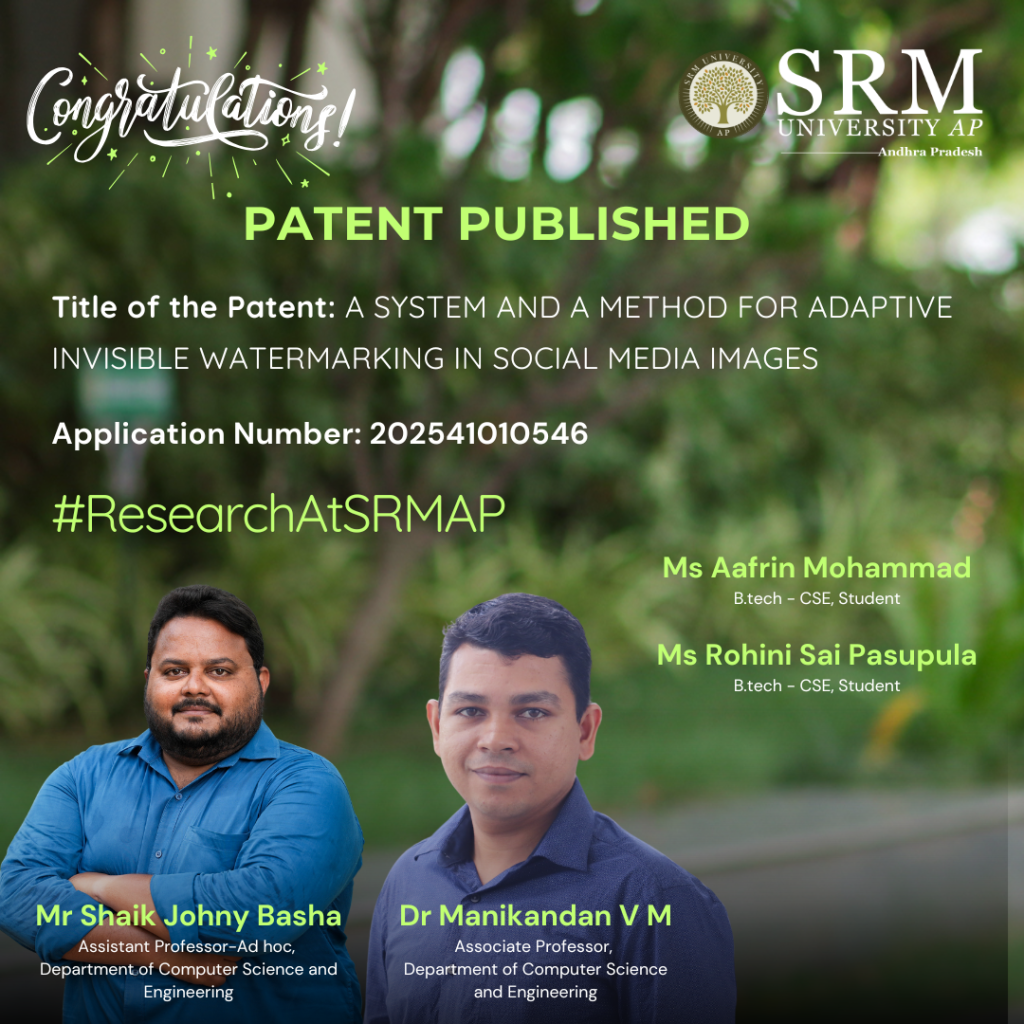 Professors, Dr Manikandan V M and Mr Shaik Johny Basha from the Department of Computer Science and Engineering along with their B.Tech. students Ms Aafrin Mohammad and Ms Rohini Sai Pasupula have published the patent titled, “A System And A Method For Adaptive Invisible Watermarking In Social Media Images.” Their patent introduces a novel method for securing photo downloads, ensuring that any unauthorised use of the images can be traced back to its original source if tampered with.
Professors, Dr Manikandan V M and Mr Shaik Johny Basha from the Department of Computer Science and Engineering along with their B.Tech. students Ms Aafrin Mohammad and Ms Rohini Sai Pasupula have published the patent titled, “A System And A Method For Adaptive Invisible Watermarking In Social Media Images.” Their patent introduces a novel method for securing photo downloads, ensuring that any unauthorised use of the images can be traced back to its original source if tampered with.Abstract:
The invention presents a System and Method for Adaptive Invisible Watermarking in Social Media Images to enhance digital privacy and copyright protection. The proposed system integrates advanced invisible watermarking technology to embed unique, imperceptible metadata into images. When users attempt to download or screenshot images from social media, the system automatically adds a hidden watermark containing identifying details such as IP address, Date, Time, and Location. This ensures that any unauthorized use of the images can be traced back to the source. By combining image processing, data encryption, and digital rights management, this system provides a robust solution for protecting online images without affecting their visible quality.
Explanation in Layperson’s Terms:
In today’s digital world, people frequently share personal photos on social media, but there is very little protection against unauthorized downloads or screenshots. Once an image is copied, there is no way to track who took it or where it is being used. Through their invention, the team solves this problem by embedding a hidden watermark in images without changing how they look. This hidden watermark automatically adds invisible information such as the IP address, location, date, and time of the user who downloads or screenshots the image. This means that if the image is misused or shared without permission, it can be traced back to the source. By combining image editing techniques, encryption, and digital security, they ensure that people’s photos remain safe and trackable online. Hence, the invention provides a new way to protect privacy and copyright while allowing users to engage freely on social media.
Practical and Social Implications:
The proposed Adaptive Invisible Watermarking System can be practically implemented using a combination of image processing algorithms, digital watermarking techniques, and cloud-based metadata storage. Below are the key steps in its real-world application:
- Integration with Social Media Platforms: The system can be embedded in social media platforms like Facebook, Instagram, X, and LinkedIn to automatically apply invisible watermarks containing metadata (IP address, timestamp, location, etc.) to uploaded images without altering their visual appearance.
- Automatic Watermarking During Downloads or Screenshots: When a user downloads or screenshots an image, the system automatically applies a second layer of invisible watermarking that includes identifying information of the downloader, ensuring every image copy has a unique identifier for traceability.
- Forensic Tracking and Copyright Protection: If an unauthorized user shares or misuses an image, the embedded watermark can be extracted using forensic tools to trace back to the original downloader, aiding in copyright enforcement, digital rights management (DRM), and legal actions against unauthorized distribution.
- Security and Privacy Features: The system can implement blockchain technology to securely log watermark data, ensuring tamper-proof verification, and provides users the option to control watermarking settings based on their privacy preferences.
- Prevention of Image Misuse and Cybercrime: The system reduces cases of identity theft, deepfake creation, and revenge porn by enabling traceability of unauthorized image usage, helping protect individuals from stalking and cyber harassment.
- Enhanced Digital Privacy and Ownership Rights: Users are empowered to maintain ownership of their photos even after sharing them on social media, encouraging ethical content sharing while discouraging unauthorized downloads.
- Impact on Content Creators and Businesses: Artists, photographers, and digital content creators can protect their work from theft or unauthorized republishing, while influencers and businesses can safeguard their brand assets and prevent content duplication.
- Legal and Ethical Implications: The system encourages social media companies to take responsibility for user content protection and supports law enforcement in tracking down offenders involved in image-based cybercrimes.
Future Research Plans:
- AI-Powered Watermarking and Deep Learning for Image Security
- Blockchain-Based Digital Rights Management (DRM) for Image Ownership
- Cross-Platform Compatibility & Social Media API Integration
Link to publication: https://search.ipindia.gov.in/IPOJournal/Journal/Patent
Continue reading →